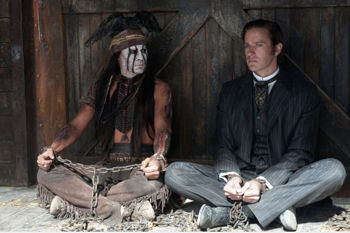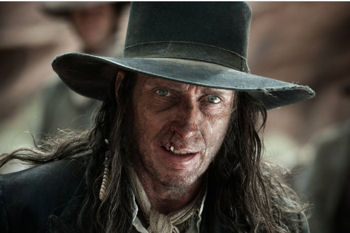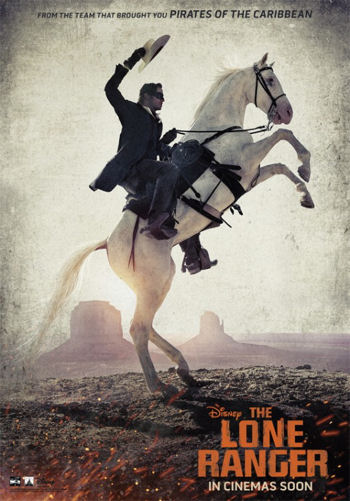|
The Lone Ranger
To be fair, it's better than The Legend of the Lone Ranger, the 1981 version of the story so bad that the lead actor had to be dubbed over by Stacy Keach. And I never saw what the WB did when they tried to launch a Lone Ranger series with Chad Michael Murray. But even without comparisons, what makes Disney's The Lone Ranger so painful is how obviously, how simply, it could have been on the right track to being a good movie.
Instead, it pulls out of the station, lumbers along building up steam then suddenly changes tracks to a loud and destructive finale. Was it arrogance on the part of two talented collaborators in Johnny Depp and Gore Verbinski? A bad test screening? Or simply failure of will to follow through on some of the ideas, hoping that the charm of stars Depp and Armie Hammer would keep people from noticing that this movie doesn't just change gears -- it changes genres half-way through, dismissing what it set up as the literal insanity of Depp's controversial Tonto.
Except that set up -- that was interesting. No amount of destruction of set pieces can make up for the destruction of ideas and actual structure.
It does seem as if Director Verbinski wanted to honor the character, but find a different way in. And the opening, though reminiscent of the deconstructionist Western Little Big Man, strikes the right notes. In 1933 San Francisco (the year creator Fran Striker's original radio series began), a young boy dressed as the Lone Ranger wanders through a carnival and into a Wild West sideshow.
Among the exhibits is an apparent statue of "the Noble Savage," a wizened Native American standing outside his hut. The figure takes in the sight of the young boy, and tears appear to well as he confuses the boy for "Kemo Sabe."
How Tonto, for indeed it is he, ended up in this exhibit is never explained. Perhaps Verbinski merely means to demonstrate how much of our image of the wild west is just myth and legend. Fine. Why not just deliver the myth and legend?
 Instead, Tonto begins an origin story, and the script adds a couple of twists that are acceptably interesting. Here Tonto assumes the role of mystic, looking for a spirit warrior to join him in his quest to find the Wendigo, a flesh-eating monster able to assume the form of man -- and even has a villain who acts like a Wendigo in Butch Cavendish (William Fichtner). Instead, Tonto begins an origin story, and the script adds a couple of twists that are acceptably interesting. Here Tonto assumes the role of mystic, looking for a spirit warrior to join him in his quest to find the Wendigo, a flesh-eating monster able to assume the form of man -- and even has a villain who acts like a Wendigo in Butch Cavendish (William Fichtner).
At first he believes his warrior will be Dan Reid (James Badge Dale), though purists know it will be the somewhat prissy John (Hammer). "I admit the brother would have been easier," opines Tonto to the young boy. But perhaps it takes a man who understands the law thoroughly to truly step outside of it and enforce its spirit.
Not bad concepts at all, but Verbinski leads Hammer into being a fussy buffoon, instead of exploring the emotional conflicts that the script makes nods toward. Every step toward heroism should have carried some sort of thrilling weight. John wants revenge, and we know he'll use the silver bullet as his calling card, but he detests guns. That moment -- bobbled. Everyone thinks John died in an ambush, so he should wear a mask, but he doesn't want to and in fact pretty much reveals to everyone of any narrative importance who he is.
That isn't just a moment bobbled, Mr. Verbinski; it's a violation of one of the fundamental laws of Jim Croce: "you don't pull the mask off the ol' Lone Ranger."
Aw, for the love of pete -- it's even on the @*#)!**@! POSTER! "Never take off the mask!"
At least by the time this creative crew blows the Lone Ranger's catch phrase of "Hi-Yo Silver, Away", the movie had taken me past the point of caring and actively wanting to fast forward ten years for the next time someone might attempt to revive the character, because this movie just wasn't going to do it.
 Though the movie takes pains to establish Cavendish (the key villain in Lone Ranger history) as something monstrous, it turns out that the real villain is much more mundane in the form of a would-be railroad baron (Tom Wilkinson). Simple greed -- the same motivating force behind most of the creative decisions of the movie -- becomes what the Lone Ranger fights, instead of the wondrous awfulness promised. Though the movie takes pains to establish Cavendish (the key villain in Lone Ranger history) as something monstrous, it turns out that the real villain is much more mundane in the form of a would-be railroad baron (Tom Wilkinson). Simple greed -- the same motivating force behind most of the creative decisions of the movie -- becomes what the Lone Ranger fights, instead of the wondrous awfulness promised.
A perfect example of the wasted potential -- an actual carnival of freaks set up in the nameless Old Texas town where the Lone Ranger first appears. Amidst the many marvels is a bordello run by Red (Helena Bonham-Carter), a woman who wishes vengeance against Cavendish herself. Once upon a time, he had actually eaten her leg, which she replaced with a scrimshaw prosthetic that doubles as a foot-gun.
But for all the energy Bonham-Carter gives to her scenes, all of them could be cut and the movie would make no more or less sense. Because, again, inexplicably, Verbinski -- or maybe some incredibly powerful yet terrible studio executive -- decided that this movie wasn't about two men fighting the fantastic.
Instead, Tonto gets dismissed as having suffered a breakdown and retreated into fantasy. Not a terrible idea, necessarily, except that everyone stops acknowledging the supernatural goings on that they had experienced. Even to the very end -- AFTER Tonto has stopped his narration and we are to believe we are seeing "objective" reality.
On a side note, this movie also commits the cardinal sin of just wasting some of the most interesting character actors we have working. Not just Bonham-Carter, but James Frain (True Blood, TRON Legacy, and the only good thing about The Cape), Stephen Root and Rance Howard (yes, Ron's dad). Not a one gets to do much more than pose, though Root can harrumph better than almost anyone.
What doesn't get wasted -- and should have been expected -- is the stunt work. The movie gets bookended by two pretty nifty set pieces of fighting on trains, and an obvious amount of love and care goes into those. Depp drifts through them not like Jack Sparrow -- that's a too easy comparison to make -- but as Buster Keaton, stone-faced and unflappable. Hammer sweats his way through them. For some people, they'll be enough.
But audiences deserve better. Heck, Hammer deserves better, a likeable handsome actor who should absolutely be a satisfying superhero, but may also be a little too willing to make fun of himself too quickly.
Who was that masked man? Don't look to this movie to find out. Rather, go back to Dynamite's Lone Ranger comics, which prove without a doubt that the character can work for 21st century audiences. All it takes is a little respect --both for what the character is supposed to be about, and for the audience itself.
|

 Instead, Tonto begins an origin story, and the script adds a couple of twists that are acceptably interesting. Here Tonto assumes the role of mystic, looking for a spirit warrior to join him in his quest to find the Wendigo, a flesh-eating monster able to assume the form of man -- and even has a villain who acts like a Wendigo in Butch Cavendish (William Fichtner).
Instead, Tonto begins an origin story, and the script adds a couple of twists that are acceptably interesting. Here Tonto assumes the role of mystic, looking for a spirit warrior to join him in his quest to find the Wendigo, a flesh-eating monster able to assume the form of man -- and even has a villain who acts like a Wendigo in Butch Cavendish (William Fichtner).
 Though the movie takes pains to establish Cavendish (the key villain in Lone Ranger history) as something monstrous, it turns out that the real villain is much more mundane in the form of a would-be railroad baron (Tom Wilkinson). Simple greed -- the same motivating force behind most of the creative decisions of the movie -- becomes what the Lone Ranger fights, instead of the wondrous awfulness promised.
Though the movie takes pains to establish Cavendish (the key villain in Lone Ranger history) as something monstrous, it turns out that the real villain is much more mundane in the form of a would-be railroad baron (Tom Wilkinson). Simple greed -- the same motivating force behind most of the creative decisions of the movie -- becomes what the Lone Ranger fights, instead of the wondrous awfulness promised.





